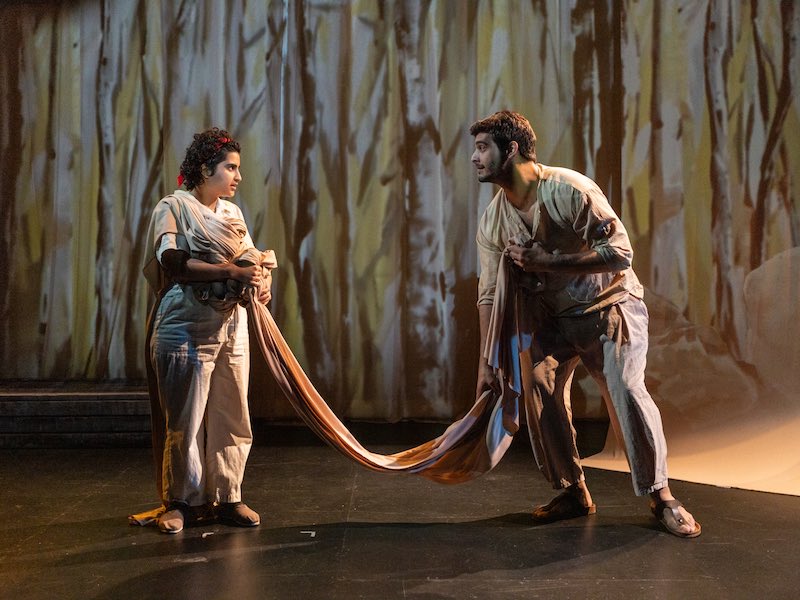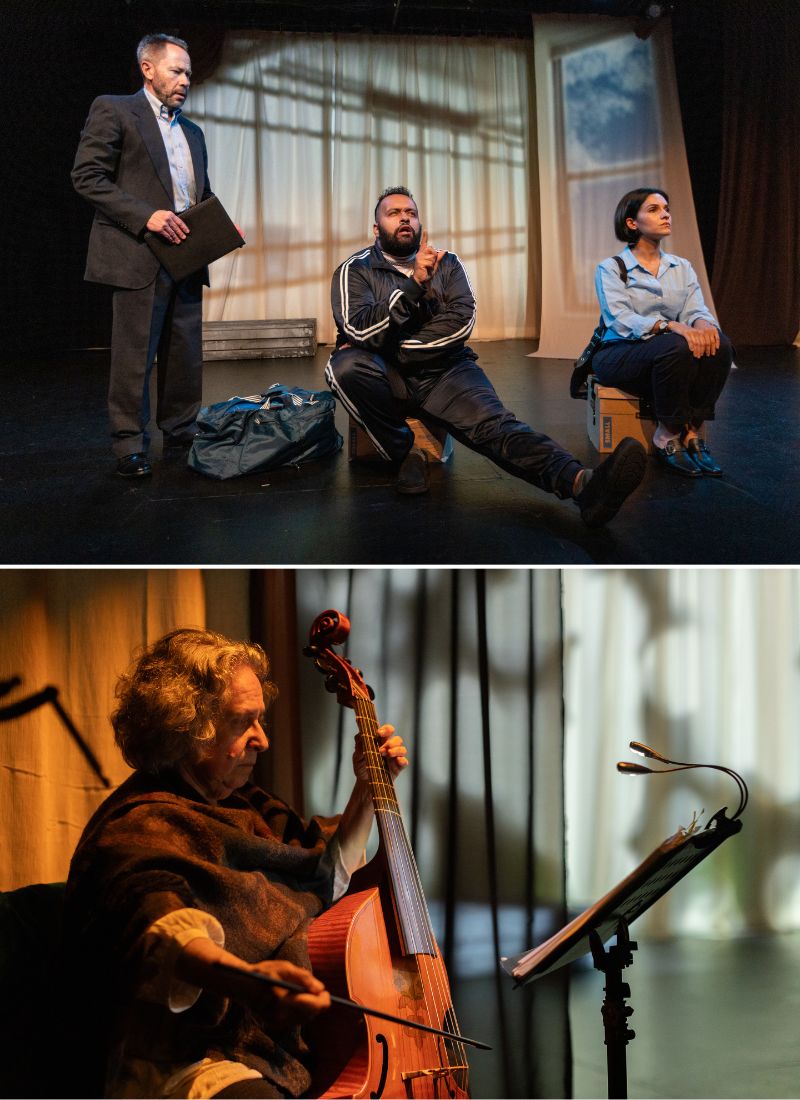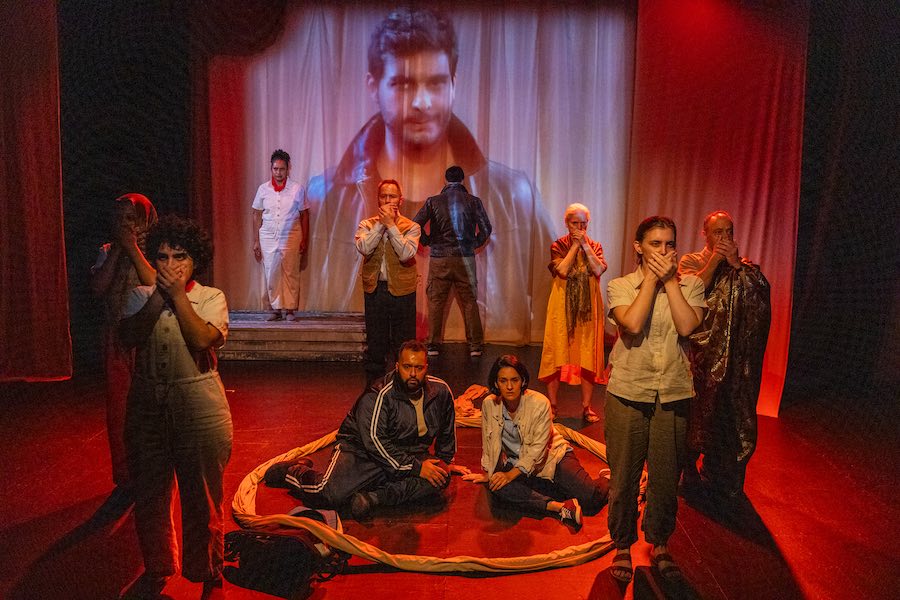It is said that audiences in ancient amphitheaters experienced a powerful emotion of pity and fear — a response that Aristotle called the “proper pleasure” of tragedy. Something like that tragic pathos happens in Scorched, a drama by Lebanese-Canadian playwright Wajdi Mouawad now playing at Atlas in an enthralling and challenging ExPats Theatre production. The storytelling in Scorched is complex and gripping — it’s a tragedy wrapped in a fable and a memory play set in a war zone. Scenes are cross-cut in time and place; a cast of 10 plays 17 characters. There is violence and horror, but it happens offstage, thus in our minds, where themes of war, family, and identity vie for our empathy. And near the end comes a shocking plot point revelation that elicits a gasp worthy of Oedipus.

Director Karin Rosnizeck has staged the play imagistically in a variety of styles, on a set draped like reminiscence in gauze (designed by Simone Schneeberg), with scenic video projections (designed by Hailey LaRoe) and melodious viola da gamba accompaniment (improvised by Tina Chancey). Wit and humor coexist unexpectedly with lyrical and trenchant poetry and the trauma of violence.
The fable framing of the play is both charming and dark. It begins with a twin brother and sister whose mother, Nawal, has just died after self-imposed silence for five years. They are instructed in her last will and testament to deliver two letters, one to their father (who they didn’t know was alive) and the other to their brother (who they didn’t know they had).
As the twin brother Simon, a boxer, Ahmad Kamal brings truculence and a fighting spirit. In counterpoint, Neagheen Homaifar brings to twin sister Janine, a mathematics professor, a steely problem-solving composure. Their pairing of brawn and brains makes for an absorbing story arc of sibling tension as together they discover their mother’s mysterious past.
Two timelines unfold: Nawal’s experiences during a civil war in an unnamed Middle Eastern country and her children’s search for answers after her death. In flashback, we see Nawal as a 15-year-old falling in love and bearing a baby (which is taken away from her).
Steve Lebens is impressive as officious notary Alphonse, Nawal’s executor, who reads the will and moves the story along often with amusingly mangled idioms (“Hell isn’t paved with good circumstances,” “Rome wasn’t built in the middle of the day”).
At age nine, the playwright Mouawad moved out of Lebanon with his family, leaving behind that country’s civil war, and much of Scorched feels scarred with a child’s memories of that conflict (“Childhood is a knife stuck in the throat” is a motif). One of the script’s wonders is how much intimate family drama it contains and how touchingly it does so. War’s brutality and cruel realities background and underlie the characters’ personal stories of trauma and resilience. Nawal’s moving mantra “Nothing means more than being together” suffuses the work.

Deema Turkomani as 14–19-year-old Nawal and Lisa Hill-Corley as 40–65-year-old Nawal portray a compelling continuity not only in their matching costumes (designed by Jeremy Pritchard) but in their extraordinary evocation of the character’s emotional lifetime.
Melan Perez as Nawal’s best friend Sawda is wonderfully sisterly. And in the role of Nawal’s grandmother, Nazira, Hilary Kacser brings a dimension of grace and dignity to a throughline of intergenerational truthtelling by women trapped in anger.
Ramsey Zeitouneh gives a standout performance as several men in Nawal’s life, including the young man she fell in love with as a girl and the nurse who took care of her as she lay dying. And in a prerecorded video clip, projected full-stage, Zeitouneh delivers a riveting monologue as a man shamelessly confessing his heinous war crimes:
I don’t contest anything that has been said at my trial over these past years. The people who claimed I tortured them – I did torture them. And the people I am accused of having killed – I did kill them. In fact, I would like to thank them all, because they made it possible for me to take some very beautiful photographs. The men I hit, and the women I raped, their faces were always more moving after the blow and after the rape.
As video inserts in live theater go, this one is stunningly done.

In the play’s many surprising shifts of tone, Scorched encompasses the horrors of war and hate alongside messages of love and reconciliation — as Narwal often says: “Nothing means more than being together.” Kudos to ExPats for bringing us together with Scorched to open us and expose us to that dichotomy and simultaneity.
Running Time: Two hours and 30 minutes including one 10-minute intermission.
Scorched plays through October 15, 2023, presented by ExPats Theatre performing in Lab Theatre II at the Atlas Performing Arts Center, 1333 H Street NE, Washington, DC. Showtimes are 7:30 pm Thursdays, Fridays, and Saturdays, and 2:30 pm Sundays. For tickets ($45, general admission; $40, senior; $20, student) call the box office at 202-399-6764 or go online.
Recommended for adults only. Mature themes include mild language and sexual content.
COVID Safety: Atlas Performing Arts Center strongly recommends that all audience members wear masks while inside the venue, but they are no longer required. See Atlas’ complete COVID policy here.
Scorched by Wajdi Mouawad
Translator: Linda Gaboriau
Cast
Deema Turkomani: Nawal (14–19), ensemble
Lisa Hill-Corley: Nawal (35–65) and Jihane (Nawal’s mother), ensemble
Neagheen Homaifar: Janine (Nawal’s daughter and Simon’s twin sister)
Ahmad Kamal: Simon (Nawal’s son and Janine’s twin brother)
Steve Lebens: Notary Alphonse Lebel and the Doctor
Ramsey Zeitouneh: Wahab (young Nawal’s lover), nurse Antoine, Nihad, and tour guide
Melan Perez: Nawal’s best friend Sawda, midwife Elhame, ensemble
Hilary Kacser: Nawal’s grandmother Nazira, wise village woman Abdessamad, ensemble
George Kassouf: boxing coach Ralph, janitor Fahim, peasant Malak, warlord Chamsedinne, a militiaman, ensemble
Emel Haddad: war photographer, newspaper photographer, TV person, ensemble, u/s Janine.
Production and Creative Team
Director: Karin Rosnizeck
Assistant Director: Shana Laski,
Stage Manager Caroline Johnson
Set Designer: Simone Schneeberger
Lighting Designer: Ian Claar
Projection Designer: Hailey LaRoe
Costume Designer: Jeremy Pritchard
Movement/Fight/Intimacy: Natasha Mirny
Technical Assistant: Laura Schlachtmeyer
Improvising Musician: Tina Chancey
Musical Advisors: Bari Biern and Scott Sedar




